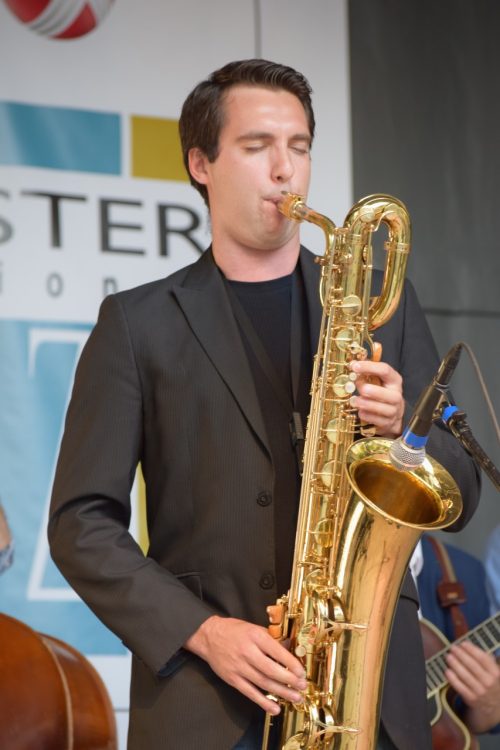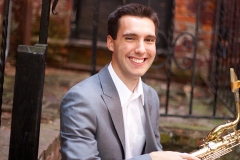The 2016 Xerox Rochester International Jazz Festival (XRIJF) is running until July 2. Among the hundreds of musicians gathering for this major musical event are many Eastman faculty members, alumni, and students. Free-lance writer Dan Gross is blogging regularly during this period with reports and interviews highlighting Eastman’s involvement in the XRIJF. Here, Dan interviews recent Eastman alumnus, baritone saxophonist, and jazz educator Karl Stabnau.
By Dan Gross
Award winning jazz baritone saxophonist Karl Stabnau is hailed as a “highly versatile and valuable musician…well versed in the tradition and future of the music.” He has made a name for himself as a both a leader and a sideman, having toured nationally with his own groups and internationally with the GRAMMY- winning “Gil Evans Centennial Project.” Karl’s many accolades include being named “Outstanding Jazz Soloist” by DownBeat magazine, being a finalist in the North American Saxophone Alliance Jazz Competition, and leading his group “Saxophonics” to a berth in the finals of the Rochester Jazz Star competition.
Karl graduated from Eastman (BM ’11; MM ’13) and is currently the Jazz Director at SUNY Brockport and their music business coordinator. This XRIJF he’s playing several gigs with Eastman alum Gabe Condon at the Strathallan (Sunday, June 26 jazz brunch; 6 to 8 p.m. today, Tuesday June 28 and Thursday June 30 in Char Lounge), and finally with Tia Brazda on Wednesday, June 29 at 6 p.m. and 10 p.m. at the Montage Music Hall.
You grew up in Brighton. What was your early music experience and how did you expand your experience at Eastman?
My earliest experiences around Rochester were with Jazz 90.1 FM. I grew up on it, my parents listened to it for years and they still listen. That was one of my earliest influences with the music. Back when I was little they used to have “Meet the Artist” concerts. Going to those was my introduction to live jazz. The influence didn’t come back until many years later, when I went through band programs and things, and those were great.
But about the time I got into high school, my parents actually heard the broadcast of EYJO, and pulled me aside to listen to it. They were the ones who really encouraged me to join. I thought it would be really fun, and I went in and talked with the director, and ended up doing a summer camp at the Eastman Community School, and ended up joining that group then. That kicked off my long relationship with Eastman. That was about 2002.
That band, and that got me serious about the music, because I could play it with really great musicians. So when the time came for looking at colleges, I was multi-faceted, I wasn’t really sure what I wanted to go into. So I had music as an interest and physics as an interest, and I knew that whichever one I ended up pursuing I’d want to do it at the highest level I could.
One of the nice things was that Eastman is a part of the University of Rochester, so I got into the physics department there, and the music department at Eastman. When I started out at Eastman, I was a triple major in physics, jazz performance, and music education major. It stayed that way until my junior year; I remember semesters of 25-27 credits outside of ensembles; I didn’t have a social life. I had my books, and my sax.
I remember the end of my sophomore year, the beginning of my junior year, and realizing that I wanted to focus on just one thing, and I was leaning towards going the music route, and focusing my time in undergrad getting better at improvising, playing the sax. So I made the decision then that I was going to drop the physics major. Now, I’ll always have a love for that science mentality; I love learning things. The music was really what resonated with me, no pun intended.
So that point, it was a decision between jazz and music education and what I wanted to finish up per major, and in New York state, if you want to teach, you need to have a master’s. I figured that it would be a good thing to go back for a master’s, and to spend the time I had devoted to practicing saxophone, improvisation … With three majors going to one, it felt like I had all the time in the world, so those were great years for laying down a good foundation for performance. Eastman was a great place to do that, the faculty there is second to none.
It was natural after that to go back for the music education master’s degree, and to have the opportunity to continue with the jazz department. I took lessons and ensembles, which was really nice.
Was there a specific moment when you realized you wanted to pursue education? Was this a calculated or spontaneous decision? Did any of your teachers guide you?
My focus has always been as a performer. What I found is that is that I would meet a lot of people who were interested in lessons; parents or kids focusing specifically on baritone saxophone. Teaching has been a big part of me, and it also affects what I do in performing. Getting asked to some undergrad and clinic work, summer camps, different schools, I was given a lot of teaching options. I don’t think I saw myself teaching in a school system, but I know that education is an important part of jazz. I can’t think of any jazz musicians who don’t know the history, and don’t teach on their gigs … I realized that going into education, it needed to be about learning how I could be a better teacher through performing.
The Eastman philosophy works really well with that. They have a program in which they teach by rote learning, you teach by ear, which fits really well with the jazz department. The two teachers that I had there, Chris Azzara and Richard Grunow, found the ways that I identify and process jazz and helped me to translate that into education and to help me build my own pedagogy and learn how I could make jazz education a part of what I did as a performer.
It sounds like your processes are intertwined. Now that you’re putting time into teaching at Brockport, how much time do you have to gig?
It’s a funny thing. People look at my teaching schedule and it seems that’s the focus (of my time). I would say that teaching takes up maybe twenty percent of my time overall. It’s one of those byproducts of having the Eastman mentality, and doing three majors is no big deal. All that structured learning time, I’m on autopilot; my brain processes that really well.
The rest of that time is spent writing and out gigging. After I went to Eastman, I got my master’s in music business from Syracuse. Coming back from that, I started with my brother, who’s also an Eastman alumnus, a music management and booking agency in Rochester called Sonic Era LLC. I would say that the other fifty percent of my time – outside of sleeping and eating – is spent doing those things.
How does it feel playing at the Jazz Fest?
I remember the first year of the Jazz Fest, and I remember it being small, only a couple venues, a few days, and being excited about that as a music student. What makes it particularly affecting is that I’ve grown up musically as the Jazz Fest has grown up musically.
I look at the legacy I’ve been a part of along the way, with my teachers and colleagues and how they’ve shaped me as a musician. I look at the Jazz Fest and I see that it has a legacy with artists that have come through and left their musical voice; a legacy for the Festival, and the Festival is creating its own legacy for Rochester. It’s definitely an honor to be considered as an artist to contribute to that legacy.
I look at jazz being represented as a whole with the progression of the Jazz Fest, which is also representative of how I’ve come through Eastman and my time as a musician. It’s honoring and humbling to be a part of that.
Dan’s remaining Jazz Festival posts this week will include interviews with Dave Rivello, Robert Bickford, Harold Danko, and John Hollenbeck.

